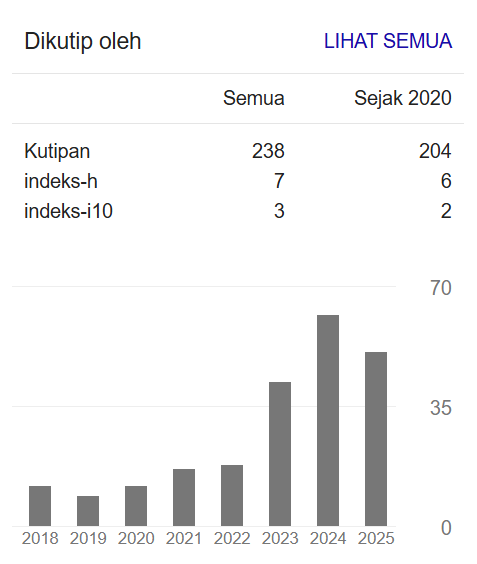FOMO IN THE PERSPECTIVE OF THE QUR’AN
A THEMATIC STUDY ON PEACE OF MIND AND SIMPLICITY OF LIFE
DOI:
https://doi.org/10.20871/tjsq.v8i1.469Keywords:
FOMO, Peace of Mind, Simplicity of Life, Thematic InterpretationAbstract
The phenomenon of FOMO (Fear of Missing Out), or the fear of missing out on certain trends, events, or social experiences, has become a common psychological symptom in the digital age. The constant anxiety to participate in the lives of others as portrayed on social media often causes restlessness, dissatisfaction, and even identity crises. The Qur’an, as a guide for Muslims, provides many verses that can be used as references to overcome such anxiety, especially through the concepts of peace of mind (sakīnah) and simplicity of life (qanā‘ah). This study aims to explore how the Qur’an offers a perspective on FOMO by analyzing verses related to inner peace and simplicity in life, in overcoming FOMO, such as Q.S. Al-Baqarah [2]: 155, Q.S. An-Nisā’ [4]: 32, Q.S. An-Nisā’ [4]: 83, and Q.S. Al-Ḥadīd [57]: 20. This study uses a library research-based method with a thematic (mawḍū‘ī) approach, which organizes and analyzes verses of the Qur’an based on theme. The main sources are the Qur’an and Tafsīr al-Taḥrīr wa al-Tanwīr by Ibn ‘Āshūr (1879–1973), a prominent Tunisian scholar known for his contextual tafsir methodology, supplemented by contemporary psychological studies. The findings show that the Qur’an promotes tranquility through faith in Allah, dependence (tawakkul), contentment (qanā‘ah), and awareness of the temporary nature of worldly life. These teachings provide a spiritual framework for combating FOMO by fostering self-awareness and a deeper meaning of life. Therefore, the values of the Qur’an can be considered a spiritual remedy for modern social anxieties such as FOMO.
References
Aji, Wahyu Trisno, Meti Rosiana, Ahmad Arfandi Musida, and Fitriati Wahyuni. “Hidup Demi Eksistensi dan Validasi di Tengah Tren FOMO Sosial Media.” Mandub: Jurnal Politik, Sosial, Hukum dan Humaniora 3, no. 1 (March 2025): 161–75. https://doi.org/10.59059/mandub.v3i1.2174.
‘Āsyūr, Muḥammad al-Ṭāhir ibn. Al-Taḥrīr wa al-Tanwīr: Taḥrīr al-Ma‘nā al-Sadīd wa Tanwīr al-‘Aql al-Jadīd min Tafsīr al-Kitāb al-Majīd. Vol. 2. Tunis: Dār al-Tūnisiyyah li al-Nashr, 1984.
———. Al-Taḥrīr wa al-Tanwīr: Taḥrīr al-Ma‘nā al-Sadīd wa Tanwīr al-‘Aql al-Jadīd min Tafsīr al-Kitāb al-Majīd. Vol. 5. Tunisa: Dār al-Tūnisiyyah li al-Nashr, 1984.
———. Al-Taḥrīr wa al-Tanwīr: Taḥrīr al-Ma‘nā al-Sadīd wa Tanwīr al-‘Aql al-Jadīd min Tafsīr al-Kitāb al-Majīd. Vol. 27. Tunisia: Dār al-Tūnisiyyah li al-Nashr, 1984.
Elsayed, Hala Abd Ellatif. “Fear of Missing Out and Its Impact: Exploring Relationships with Social Media Use, Psychological Well-Being, and Academic Performance among University Students.” Frontiers in Psychology 16 (June 2025): 1582572. https://doi.org/10.3389/fpsyg.2025.1582572.
Fitri, Hidayatul, Dyta Setiawati Hariyono, and Ghea Amalia Arpandy. “Pengaruh Self-Esteem Terhadap Fear of Missing Out (Fomo) Pada Generasi Z Pengguna Media Sosial.” Jurnal Psikologi 1, no. 4 (July 2024): 1–21. https://doi.org/10.47134/pjp.v1i4.2823.
Garfin, Dana Rose. “Technology as a Coping Tool during the Coronavirus Disease 2019 (COVID‐19) Pandemic: Implications and Recommendations.” Stress and Health 36, no. 4 (October 2020): 555–59. https://doi.org/10.1002/smi.2975.
Gupta, Mayank, and Aditya Sharma. “Fear of Missing out: A Brief Overview of Origin, Theoretical Underpinnings and Relationship with Mental Health.” World Journal of Clinical Cases 9, no. 19 (July 2021): 4881–89. https://doi.org/10.12998/wjcc.v9.i19.4881.
Hamzah Muchtar, Evan. “Tafsir Maudhu’i Q.S. Al-Isra’ Ayat 26–27: Solusi Qur’ani Fenomena Fomo dan Gaya Hidup Konsumtif Gen-Z.” JIQTA: Jurnal Ilmu Al-Qur’an dan Tafsir 4, no. 1 (June 2025): 1–14. https://doi.org/10.36769/jiqta.v4i1.937.
Hudoyo, Cindy Larasati Cipto, Chayara Rafeyla Baqita, and Daniela Sinar Sejuk Sari Rejeki Br Silitonga. “Analisis Dampak Fear of Missing Out Terhadap Kesehatan Mental Generasi Z: Studi Empiris Penggunaan Media Sosial.” AZZAHRA: Scientific Journal of Social and Humanities 3, no. 2 (May 2025): 59–69.
Isneniah, Dwi, Reni Nuryani, and Sri Wulan Lindasari. “Correlational Study: Self-Esteem and Fear of Missing out (FoMO) in Emerging Adulthood.” Holistik Jurnal Kesehatan 18, no. 2 (April 2024): 209–17. https://doi.org/10.33024/hjk.v18i2.264.
Khadijah, Khairiyah, Maria Oktasari, Hayu Stevani, and M. Ramli. “Fear of Missing Out (Fomo) dalam Perspektif Teori Solution Focused Brief Counseling.” Research and Development Journal of Education 9, no. 1 (April 2023): 336–43. https://doi.org/10.30998/rdje.v9i1.14841.
Khairunnisa, Fathi Karuna, Leni Dwi Ambarwati, and Sheila Hariry. “Kesehatan Mental dan FOMO (Fear of Missing Out): Solusi Psikologi Agama (Islam) pada Era Digital.” Jurnal Penelitian Ilmiah Multidisipliner 2, no. 02 (July 2025): 165–73.
Margaretha, Marcella Nathasya. “Hubungan antara Kepuasan Hidup dengan Fear of Missing Out (FoMO) Pada Remaja Pengguna Media Sosial.” Psikoislamika: Jurnal Psikologi dan Psikologi Islam 20, no. 2 (December 2023): 687–97. https://doi.org/10.18860/psikoislamika.v20i2.23219.
Maulida, Faza. “Peran Fear of Missing Out (FoMO) dan Regulasi Emosi untuk Memprediksi Kesejahteraan Psikologis pada Pengguna Media Sosial.” Jurnal Diversita 11, no. 1 (June 2025): 110–18. https://doi.org/10.31289/diversita.v11i1.14707.
Nurhasanah, Anis. “Fenomena FOMO (Fear of Missing Out) pada Masyarakat Perkotaan di Indonesia.” Mandalika: Jurnal Ilmu Pendidikan dan Bahasa 2, no. 2 (December 2024): 97–106. https://doi.org/10.59613/jipb.v2i2.199.
Przybylski, Andrew K., Kou Murayama, Cody R. DeHaan, and Valerie Gladwell. “Motivational, Emotional, and Behavioral Correlates of Fear of Missing Out.” Computers in Human Behavior 29, no. 4 (July 2013): 1841–48. https://doi.org/10.1016/j.chb.2013.02.014.
Qurṭubī, Abū ‘Abdillāh Muḥammad ibn Aḥmad al-Anṣārī al-. Al-Jāmi‘ li Aḥkām al-Qur’ān. Edited by Aḥmad al-Bardūnī and Ibrāhīm Aṭfīsh. Vol. 17. Kairo: Dār al-Kutub al-Miṣriyyah, 1964.
Sha‘rāwī, Muḥammad Mutawallī al-.Tafsīr al-Sha‘rāwī: Al-Khawāṭir. Vol. 2. Kairo: Maṭābi‘ Akhbār al-Yawm, 1997.
———. Tafsīr al-Sha‘rāwī: Al-Khawāṭir. Vol. 4. Kairo: Maṭābi‘ Akhbār al-Yawm, 1997.
Ṭabarī, Abū Ja‘far Muḥammad ibn Jarīr al-. Jāmi‘ al-Bayān ‘an Ta’wīl Āy al-Qur’ān. Vol. 8. Makkah: Dār al-Tarbiyyah wa al-Turāth, n.d.
Utama, Mukti. “Pengaruh Fear of Missing Out (FoMO) Terhadap Kesejahteraan Psikologis Generasi Z dengan Dukungan Sosial Sebagai Moderator.” Journal of Innovative and Creativity 5, no. 3 (September 2025): 26257–64. https://doi.org/10.31004/joecy.v5i3.3833.
Yulya, Tri Wahyuni, Loviana, Debby Huriyah Ghonniyyu, Nilam Putri Efendi, Klara Audi Permata Hati, Anindya Wira Larasati, Shafira Atsillia Irawan, et al. “Fear of Missing Out (FOMO) Sebagai Gaya Hidup di Era Modernisasi.” Proceeding Conference on Psychology and Behavioral Sciences 1 (2022): 68–72. https://doi.org/10.61994/cpbs.v1i1.12.
Downloads
Published
How to Cite
Issue
Section
License
Copyright (c) 2025 Selamet Riadi, Abdul Wahab, Citra Lestari

This work is licensed under a Creative Commons Attribution 4.0 International License.






















